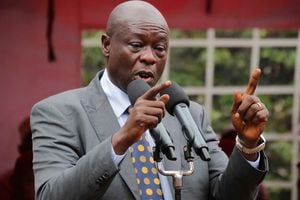Kenya most liberal financial market in whole of Africa

President William Ruto shakes hands with Chinese President Xi Jinping during bilateral talks at the Great Hall of the People in Beijing on September 3, 2024.
What you need to know:
- China and Kenya have a time-honoured friendship and have jointly completed several flagship projects.
- This year’s FOCAC Summit indeed, gave us a good opportunity to focus on some of the challenges facing Africa.
Recently, I accompanied President William Ruto to China to attend the 2024 Beijing Summit of the Forum on China-Africa Cooperation (FOCAC).
It was my first time, but this programme has been there for the last 24 years, and this year’s one in Beijing was very important because 53 countries from Africa were represented. The Summit enhanced the partnership between China and the African continent.
Notably, China and Kenya have a time-honoured friendship and have jointly completed several flagship projects in connectivity, significantly contributing to regional economic and social development.
During the Summit, Chinese President Xi Jinping announced that China was now elevating the partnership between the African continent and China to the strategic level, which means China is taking this partnership extremely seriously and positively.
We on the continent also appreciate that this new status is granted to the partnership. President Xi made an important statement on future cooperation. He said that in terms of trade and development, least developed countries (LDCs), including the 33 countries in Africa, can enjoy zero-tariff treatment for access to the Chinese market.
Over and above that, he made important statements on the continued investment in infrastructure under the Belt and Road Initiative.
Regional conflicts
He also discussed the issues of global security, cultural and people-to-people contacts, technology exchanges, and other aspects. So, it was broad, and I think it was a very successful meeting. The Summit was held at a time marked by rising regional conflicts and severe challenges to global development that called for the Global South countries to forge solidarity to address common global challenges.
The media coverage has focused more on the challenges in Ukraine and the Middle East, putting conflicts, for instance in, Sudan, Sahel, and the challenges facing in the Horn of Africa on the back burner.
This year’s FOCAC Summit indeed, gave us a good opportunity to focus on some of the challenges facing Africa. We even had a delegation from Sudan who had a chance to present their grievances.
Under our Global South relations, from a diplomatic angle, China can play a role in working with the African Union, and work with the countries of Africa by bringing the conflicting parties in Sudan to the negotiating table in search of a peaceful solution.
Back at home, FOCAC played a key role in promoting China-Kenya relations. In Kenya, we have strong outcomes from the partnership between Kenya and China. We have examples of the Standard Gauge Railway (SGR) that improves connectivity. We are now talking about extending it to Uganda and beyond.
The Chinese firms that built the Nairobi expressway were built through a Public-Private Partnership (PPP), and we can have more of these in the future. The friendship with China has also enabled quite several roads to be built.
During FOCAC Kenya signed off about Sh36 billion ($281 million) to help to complete about 15 roads in different parts of the country which will have a serious multiplier effect on the economy.
Liberalised market
We also have partnerships in the areas of ICT going on with big Chinese companies looking at Kenya as an investment destination.
As the Kenya Kwanza government, we want to lay 100,000 km of fibre optic cable to increase connectivity in the country and provide digital opportunities for our young people. As a hub in technology, we want to allow the 70 percent of our population that is 35 years and below.
This is a sector where the Chinese companies are already in but they could do more.
On the tourism front, we receive about 200,000 tourists from China annually and these numbers will only go up because Kenya is now a visa-free country.
Many areas in Kenya have the most potential to attract Chinese investors, and agriculture is one area with a lot of potential. With partnership, and joint ventures between Kenyan and Chinese companies in manufacturing, we can work together, and export to the European, and the American market.
One of the things that is important for investors from China to know is that Kenya is the most liberal financial market in Africa where one can bring in their money and can take it out. Our shilling is fully convertible; we have no exchange restrictions.
This is something shareholders always worry about. If you bring money into a country and it is time to pay your dividend, can you pay your shareholders a dividend?
In Kenya, you have a liberalised market, which is why Kenya is the financial hub in the East Africa region. The market gives a good opportunity for an investor aided by the Capital Markets Authority, which offers an investor room to invest in various industries through the stock exchange in Nairobi.
The writer is the Prime Cabinet Secretary, and Cabinet Secretary for Foreign and Diaspora Affairs.





